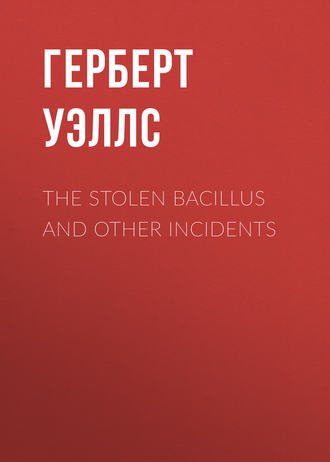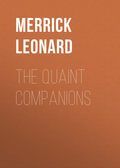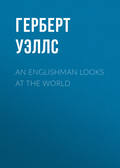
Герберт Джордж Уэллс
The Stolen Bacillus and Other Incidents
THE TEMPTATION OF HARRINGAY
It is quite impossible to say whether this thing really happened. It depends entirely on the word of R.M. Harringay, who is an artist.
Following his version of the affair, the narrative deposes that Harringay went into his studio about ten o'clock to see what he could make of the head that he had been working at the day before. The head in question was that of an Italian organ-grinder, and Harringay thought – but was not quite sure – that the title would be the "Vigil." So far he is frank, and his narrative bears the stamp of truth. He had seen the man expectant for pennies, and with a promptness that suggested genius, had had him in at once.
"Kneel. Look up at that bracket," said Harringay. "As if you expected pennies."
"Don't grin!" said Harringay. "I don't want to paint your gums. Look as though you were unhappy."
Now, after a night's rest, the picture proved decidedly unsatisfactory. "It's good work," said Harringay. "That little bit in the neck … But."
He walked about the studio and looked at the thing from this point and from that. Then he said a wicked word. In the original the word is given.
"Painting," he says he said. "Just a painting of an organ-grinder – a mere portrait. If it was a live organ-grinder I wouldn't mind. But somehow I never make things alive. I wonder if my imagination is wrong." This, too, has a truthful air. His imagination is wrong.
"That creative touch! To take canvas and pigment and make a man – as Adam was made of red ochre! But this thing! If you met it walking about the streets you would know it was only a studio production. The little boys would tell it to 'Garnome and git frimed.' Some little touch … Well – it won't do as it is."
He went to the blinds and began to pull them down. They were made of blue holland with the rollers at the bottom of the window, so that you pull them down to get more light. He gathered his palette, brushes, and mahl stick from his table. Then he turned to the picture and put a speck of brown in the corner of the mouth; and shifted his attention thence to the pupil of the eye. Then he decided that the chin was a trifle too impassive for a vigil.
Presently he put down his impedimenta, and lighting a pipe surveyed the progress of his work. "I'm hanged if the thing isn't sneering at me," said Harringay, and he still believes it sneered.
The animation of the figure had certainly increased, but scarcely in the direction he wished. There was no mistake about the sneer. "Vigil of the Unbeliever," said Harringay. "Rather subtle and clever that! But the left eyebrow isn't cynical enough."
He went and dabbed at the eyebrow, and added a little to the lobe of the ear to suggest materialism. Further consideration ensued. "Vigil's off, I'm afraid," said Harringay. "Why not Mephistopheles? But that's a bit too common. 'A Friend of the Doge,' – not so seedy. The armour won't do, though. Too Camelot. How about a scarlet robe and call him 'One of the Sacred College'? Humour in that, and an appreciation of Middle Italian History."
"There's always Benvenuto Cellini," said Harringay; "with a clever suggestion of a gold cup in one corner. But that would scarcely suit the complexion."
He describes himself as babbling in this way in order to keep down an unaccountably unpleasant sensation of fear. The thing was certainly acquiring anything but a pleasing expression. Yet it was as certainly becoming far more of a living thing than it had been – if a sinister one – far more alive than anything he had ever painted before. "Call it 'Portrait of a Gentleman,'" said Harringay; – "A Certain Gentleman."
"Won't do," said Harringay, still keeping up his courage. "Kind of thing they call Bad Taste. That sneer will have to come out. That gone, and a little more fire in the eye – never noticed how warm his eye was before – and he might do for – ? What price Passionate Pilgrim? But that devilish face won't do —this side of the Channel.
"Some little inaccuracy does it," he said; "eyebrows probably too oblique," – therewith pulling the blind lower to get a better light, and resuming palette and brushes.
The face on the canvas seemed animated by a spirit of its own. Where the expression of diablerie came in he found impossible to discover. Experiment was necessary. The eyebrows – it could scarcely be the eyebrows? But he altered them. No, that was no better; in fact, if anything, a trifle more satanic. The corner of the mouth? Pah! more than ever a leer – and now, retouched, it was ominously grim. The eye, then? Catastrophe! he had filled his brush with vermilion instead of brown, and yet he had felt sure it was brown! The eye seemed now to have rolled in its socket, and was glaring at him an eye of fire. In a flash of passion, possibly with something of the courage of panic, he struck the brush full of bright red athwart the picture; and then a very curious thing, a very strange thing indeed, occurred – if it did occur.
The diabolified Italian before him shut both his eyes, pursed his mouth, and wiped the colour off his face with his hand.
Then the red eye opened again, with a sound like the opening of lips, and the face smiled. "That was rather hasty of you," said the picture.
Harringay states that, now that the worst had happened, his self-possession returned. He had a saving persuasion that devils were reasonable creatures.
"Why do you keep moving about then," he said, "making faces and all that – sneering and squinting, while I am painting you?"
"I don't," said the picture.
"You do," said Harringay.
"It's yourself," said the picture.
"It's not myself," said Harringay.
"It is yourself," said the picture. "No! don't go hitting me with paint again, because it's true. You have been trying to fluke an expression on my face all the morning. Really, you haven't an idea what your picture ought to look like."
"I have," said Harringay.
"You have not," said the picture: "You never have with your pictures. You always start with the vaguest presentiment of what you are going to do; it is to be something beautiful – you are sure of that – and devout, perhaps, or tragic; but beyond that it is all experiment and chance. My dear fellow! you don't think you can paint a picture like that?"
Now it must be remembered that for what follows we have only Harringay's word.
"I shall paint a picture exactly as I like," said Harringay, calmly.
This seemed to disconcert the picture a little. "You can't paint a picture without an inspiration," it remarked.
"But I had an inspiration – for this."
"Inspiration!" sneered the sardonic figure; "a fancy that came from your seeing an organ-grinder looking up at a window! Vigil! Ha, ha! You just started painting on the chance of something coming – that's what you did. And when I saw you at it I came. I want a talk with you!"
"Art, with you," said the picture, – "it's a poor business. You potter. I don't know how it is, but you don't seem able to throw your soul into it. You know too much. It hampers you. In the midst of your enthusiasms you ask yourself whether something like this has not been done before. And …"
"Look here," said Harringay, who had expected something better than criticism from the devil. "Are you going to talk studio to me?" He filled his number twelve hoghair with red paint.
"The true artist," said the picture, "is always an ignorant man. An artist who theorises about his work is no longer artist but critic. Wagner … I say! – What's that red paint for?"
"I'm going to paint you out," said Harringay. "I don't want to hear all that Tommy Rot. If you think just because I'm an artist by trade I'm going to talk studio to you, you make a precious mistake."
"One minute," said the picture, evidently alarmed. "I want to make you an offer – a genuine offer. It's right what I'm saying. You lack inspirations. Well. No doubt you've heard of the Cathedral of Cologne, and the Devil's Bridge, and – "
"Rubbish," said Harringay. "Do you think I want to go to perdition simply for the pleasure of painting a good picture, and getting it slated. Take that."
His blood was up. His danger only nerved him to action, so he says. So he planted a dab of vermilion in his creature's mouth. The Italian spluttered and tried to wipe it off – evidently horribly surprised. And then – according to Harringay – there began a very remarkable struggle, Harringay splashing away with the red paint, and the picture wriggling about and wiping it off as fast as he put it on. "Two masterpieces," said the demon. "Two indubitable masterpieces for a Chelsea artist's soul. It's a bargain?" Harringay replied with the paint brush.
For a few minutes nothing could be heard but the brush going and the spluttering and ejaculations of the Italian. A lot of the strokes he caught on his arm and hand, though Harringay got over his guard often enough. Presently the paint on the palette gave out and the two antagonists stood breathless, regarding each other. The picture was so smeared with red that it looked as if it had been rolling about a slaughterhouse, and it was painfully out of breath and very uncomfortable with the wet paint trickling down its neck. Still, the first round was in its favour on the whole. "Think," it said, sticking pluckily to its point, "two supreme masterpieces – in different styles. Each equivalent to the Cathedral…"
"I know," said Harringay, and rushed out of the studio and along the passage towards his wife's boudoir.
In another minute he was back with a large tin of enamel – Hedge Sparrow's Egg Tint, it was, and a brush. At the sight of that the artistic devil with the red eye began to scream. "Three masterpieces – culminating masterpieces."
Harringay delivered cut two across the demon, and followed with a thrust in the eye. There was an indistinct rumbling. "Four masterpieces," and a spitting sound.
But Harringay had the upper hand now and meant to keep it. With rapid, bold strokes he continued to paint over the writhing canvas, until at last it was a uniform field of shining Hedge Sparrow tint. Once the mouth reappeared and got as far as "Five master – " before he filled it with enamel; and near the end the red eye opened and glared at him indignantly. But at last nothing remained save a gleaming panel of drying enamel. For a little while a faint stirring beneath the surface puckered it slightly here and there, but presently even that died away and the thing was perfectly still.
Then Harringay – according to Harringay's account – lit his pipe and sat down and stared at the enamelled canvas, and tried to make out clearly what had happened. Then he walked round behind it, to see if the back of it was at all remarkable. Then it was he began to regret he had not photographed the Devil before he painted him out.
This is Harringay's story – not mine. He supports it by a small canvas (24 by 20) enamelled a pale green, and by violent asseverations. It is also true that he never has produced a masterpiece, and in the opinion of his intimate friends probably never will.
THE FLYING MAN
The Ethnologist looked at the bhimraj feather thoughtfully. "They seemed loth to part with it," he said.
"It is sacred to the Chiefs," said the lieutenant; "just as yellow silk, you know, is sacred to the Chinese Emperor."
The Ethnologist did not answer. He hesitated. Then opening the topic abruptly, "What on earth is this cock-and-bull story they have of a flying man?"
The lieutenant smiled faintly. "What did they tell you?"
"I see," said the Ethnologist, "that you know of your fame."
The lieutenant rolled himself a cigarette. "I don't mind hearing about it once more. How does it stand at present?"
"It's so confoundedly childish," said the Ethnologist, becoming irritated. "How did you play it off upon them?"
The lieutenant made no answer, but lounged back in his folding-chair, still smiling.
"Here am I, come four hundred miles out of my way to get what is left of the folk-lore of these people, before they are utterly demoralised by missionaries and the military, and all I find are a lot of impossible legends about a sandy-haired scrub of an infantry lieutenant. How he is invulnerable – how he can jump over elephants – how he can fly. That's the toughest nut. One old gentleman described your wings, said they had black plumage and were not quite as long as a mule. Said he often saw you by moonlight hovering over the crests out towards the Shendu country. – Confound it, man!"
The lieutenant laughed cheerfully. "Go on," he said. "Go on."
The Ethnologist did. At last he wearied. "To trade so," he said, "on these unsophisticated children of the mountains. How could you bring yourself to do it, man?"
"I'm sorry," said the lieutenant, "but truly the thing was forced upon me. I can assure you I was driven to it. And at the time I had not the faintest idea of how the Chin imagination would take it. Or curiosity. I can only plead it was an indiscretion and not malice that made me replace the folk-lore by a new legend. But as you seem aggrieved, I will try and explain the business to you.
"It was in the time of the last Lushai expedition but one, and Walters thought these people you have been visiting were friendly. So, with an airy confidence in my capacity for taking care of myself, he sent me up the gorge – fourteen miles of it – with three of the Derbyshire men and half a dozen Sepoys, two mules, and his blessing, to see what popular feeling was like at that village you visited. A force of ten – not counting the mules – fourteen miles, and during a war! You saw the road?"
"Road!" said the Ethnologist.
"It's better now than it was. When we went up we had to wade in the river for a mile where the valley narrows, with a smart stream frothing round our knees and the stones as slippery as ice. There it was I dropped my rifle. Afterwards the Sappers blasted the cliff with dynamite and made the convenient way you came by. Then below, where those very high cliffs come, we had to keep on dodging across the river – I should say we crossed it a dozen times in a couple of miles.
"We got in sight of the place early the next morning. You know how it lies, on a spur halfway between the big hills, and as we began to appreciate how wickedly quiet the village lay under the sunlight, we came to a stop to consider.
"At that they fired a lump of filed brass idol at us, just by way of a welcome. It came twanging down the slope to the right of us where the boulders are, missed my shoulder by an inch or so, and plugged the mule that carried all the provisions and utensils. I never heard such a death-rattle before or since. And at that we became aware of a number of gentlemen carrying matchlocks, and dressed in things like plaid dusters, dodging about along the neck between the village and the crest to the east.
"'Right about face,' I said. 'Not too close together.'
"And with that encouragement my expedition of ten men came round and set off at a smart trot down the valley again hitherward. We did not wait to save anything our dead had carried, but we kept the second mule with us – he carried my tent and some other rubbish – out of a feeling of friendship.
"So ended the battle – ingloriously. Glancing back, I saw the valley dotted with the victors, shouting and firing at us. But no one was hit. These Chins and their guns are very little good except at a sitting shot. They will sit and finick over a boulder for hours taking aim, and when they fire running it is chiefly for stage effect. Hooker, one of the Derbyshire men, fancied himself rather with the rifle, and stopped behind for half a minute to try his luck as we turned the bend. But he got nothing.
"I'm not a Xenophon to spin much of a yarn about my retreating army. We had to pull the enemy up twice in the next two miles when he became a bit pressing, by exchanging shots with him, but it was a fairly monotonous affair – hard breathing chiefly – until we got near the place where the hills run in towards the river and pinch the valley into a gorge. And there we very luckily caught a glimpse of half a dozen round black heads coming slanting-ways over the hill to the left of us – the east that is – and almost parallel with us.
"At that I called a halt. 'Look here,' says I to Hooker and the other Englishmen; 'what are we to do now?' and I pointed to the heads.
"'Headed orf, or I'm a nigger,' said one of the men.
"'We shall be,' said another. 'You know the Chin way, George?'
"'They can pot every one of us at fifty yards,' says Hooker, 'in the place where the river is narrow. It's just suicide to go on down.'
"I looked at the hill to the right of us. It grew steeper lower down the valley, but it still seemed climbable. And all the Chins we had seen hitherto had been on the other side of the stream.
"'It's that or stopping,' says one of the Sepoys.
"So we started slanting up the hill. There was something faintly suggestive of a road running obliquely up the face of it, and that we followed. Some Chins presently came into view up the valley, and I heard some shots. Then I saw one of the Sepoys was sitting down about thirty yards below us. He had simply sat down without a word, apparently not wishing to give trouble. At that I called a halt again; I told Hooker to try another shot, and went back and found the man was hit in the leg. I took him up, carried him along to put him on the mule – already pretty well laden with the tent and other things which we had no time to take off. When I got up to the rest with him, Hooker had his empty Martini in his hand, and was grinning and pointing to a motionless black spot up the valley. All the rest of the Chins were behind boulders or back round the bend. 'Five hundred yards,' says Hooker, 'if an inch. And I'll swear I hit him in the head.'
"I told him to go and do it again, and with that we went on again.
"Now the hillside kept getting steeper as we pushed on, and the road we were following more and more of a shelf. At last it was mere cliff above and below us. 'It's the best road I have seen yet in Chin Lushai land,' said I to encourage the men, though I had a fear of what was coming.
"And in a few minutes the way bent round a corner of the cliff. Then, finis! the ledge came to an end.
"As soon as he grasped the position one of the Derbyshire men fell a-swearing at the trap we had fallen into. The Sepoys halted quietly. Hooker grunted and reloaded, and went back to the bend.
"Then two of the Sepoy chaps helped their comrade down and began to unload the mule.
"Now, when I came to look about me, I began to think we had not been so very unfortunate after all. We were on a shelf perhaps ten yards across it at widest. Above it the cliff projected so that we could not be shot down upon, and below was an almost sheer precipice of perhaps two or three hundred feet. Lying down we were invisible to anyone across the ravine. The only approach was along the ledge, and on that one man was as good as a host. We were in a natural stronghold, with only one disadvantage, our sole provision against hunger and thirst was one live mule. Still we were at most eight or nine miles from the main expedition, and no doubt, after a day or so, they would send up after us if we did not return.
"After a day or so …"
The lieutenant paused. "Ever been thirsty, Graham?"
"Not that kind," said the Ethnologist.
"H'm. We had the whole of that day, the night, and the next day of it, and only a trifle of dew we wrung out of our clothes and the tent. And below us was the river going giggle, giggle, round a rock in mid stream. I never knew such a barrenness of incident, or such a quantity of sensation. The sun might have had Joshua's command still upon it for all the motion one could see; and it blazed like a near furnace. Towards the evening of the first day one of the Derbyshire men said something – nobody heard what – and went off round the bend of the cliff. We heard shots, and when Hooker looked round the corner he was gone. And in the morning the Sepoy whose leg was shot was in delirium, and jumped or fell over the cliff. Then we took the mule and shot it, and that must needs go over the cliff too in its last struggles, leaving eight of us.
"We could see the body of the Sepoy down below, with the head in the water. He was lying face downwards, and so far as I could make out was scarcely smashed at all. Badly as the Chins might covet his head, they had the sense to leave it alone until the darkness came.
"At first we talked of all the chances there were of the main body hearing the firing, and reckoned whether they would begin to miss us, and all that kind of thing, but we dried up as the evening came on. The Sepoys played games with bits of stone among themselves, and afterwards told stories. The night was rather chilly. The second day nobody spoke. Our lips were black and our throats afire, and we lay about on the ledge and glared at one another. Perhaps it's as well we kept our thoughts to ourselves. One of the British soldiers began writing some blasphemous rot on the rock with a bit of pipeclay, about his last dying will, until I stopped it. As I looked over the edge down into the valley and saw the river rippling I was nearly tempted to go after the Sepoy. It seemed a pleasant and desirable thing to go rushing down through the air with something to drink – or no more thirst at any rate – at the bottom. I remembered in time, though, that I was the officer in command, and my duty to set a good example, and that kept me from any such foolishness.
"Yet, thinking of that, put an idea into my head. I got up and looked at the tent and tent ropes, and wondered why I had not thought of it before. Then I came and peered over the cliff again. This time the height seemed greater and the pose of the Sepoy rather more painful. But it was that or nothing. And to cut it short, I parachuted.
"I got a big circle of canvas out of the tent, about three times the size of that table-cover, and plugged the hole in the centre, and I tied eight ropes round it to meet in the middle and make a parachute. The other chaps lay about and watched me as though they thought it was a new kind of delirium. Then I explained my notion to the two British soldiers and how I meant to do it, and as soon as the short dusk had darkened into night, I risked it. They held the thing high up, and I took a run the whole length of the ledge. The thing filled with air like a sail, but at the edge I will confess I funked and pulled up.
"As soon as I stopped I was ashamed of myself – as well I might be in front of privates – and went back and started again. Off I jumped this time – with a kind of sob, I remember – clean into the air, with the big white sail bellying out above me.
"I must have thought at a frightful pace. It seemed a long time before I was sure that the thing meant to keep steady. At first it heeled sideways. Then I noticed the face of the rock which seemed to be streaming up past me, and me motionless. Then I looked down and saw in the darkness the river and the dead Sepoy rushing up towards me. But in the indistinct light I also saw three Chins, seemingly aghast at the sight of me, and that the Sepoy was decapitated. At that I wanted to go back again.
"Then my boot was in the mouth of one, and in a moment he and I were in a heap with the canvas fluttering down on the top of us. I fancy I dashed out his brains with my foot. I expected nothing more than to be brained myself by the other two, but the poor heathen had never heard of Baldwin, and incontinently bolted.
"I struggled out of the tangle of dead Chin and canvas, and looked round. About ten paces off lay the head of the Sepoy staring in the moonlight. Then I saw the water and went and drank. There wasn't a sound in the world but the footsteps of the departing Chins, a faint shout from above, and the gluck of the water. So soon as I had drunk my full I started off down the river.
"That about ends the explanation of the flying man story. I never met a soul the whole eight miles of the way. I got to Walters' camp by ten o'clock, and a born idiot of a sentinel had the cheek to fire at me as I came trotting out of the darkness. So soon as I had hammered my story into Winter's thick skull, about fifty men started up the valley to clear the Chins out and get our men down. But for my own part I had too good a thirst to provoke it by going with them.
"You have heard what kind of a yarn the Chins made of it. Wings as long as a mule, eh? – And black feathers! The gay lieutenant bird! Well, well."
The lieutenant meditated cheerfully for a moment. Then he added, "You would scarcely credit it, but when they got to the ridge at last, they found two more of the Sepoys had jumped over."
"The rest were all right?" asked the Ethnologist.
"Yes," said the lieutenant; "the rest were all right, barring a certain thirst, you know."
And at the memory he helped himself to soda and whisky again.







